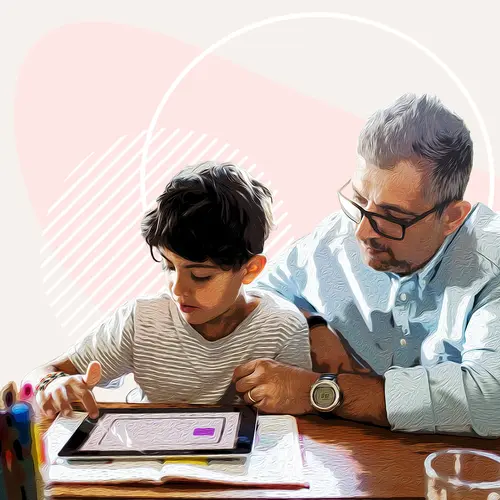It’s not unusual to have mixed feelings about your child’s diagnosis with ADHD (attention deficit hyperactivity disorder). The behaviors that led to it may create stress in your family and social life for quite a while. You might worry about how your child (and others) will react to being “labeled,” on top of all your other challenges. Don’t let that keep you from talking with your kid about it. Discovering together how your child’s brain works can be a first step toward improving their symptoms.
Jen Mackay found out her son, James, had ADHD when he was 6 years old. “[It] was a bit of a relief, because we felt like it explained some of the things we were seeing,” she says. She was also hopeful that the diagnosis meant they’d be able to find the right tools to help James. “He was a constant ‘behavior problem’ in his preschool and transitional kindergarten classes, which was so discouraging for him. In fact, we decided to pull him from public kindergarten because I didn’t want him to think that he was bad. In retrospect, I wish that we had been [able] to diagnose him and start treating his ADHD earlier.”
In this way, finding out your child has ADHD is a good thing, and you can help explain it to them by focusing on the positives.
Knowledge Is Power
Many times, ADHD runs in families. That means your child didn’t do anything to cause it -- nor did you. On the other hand, now that you know what you’re dealing with, you can both do things to help your child be more successful.
“We came at it from the standpoint that he’s at an advantage knowing the things he needed to work on and that everyone can improve with time and practice,” Mackay says. “He had the best heart and loved all of his friends. It was confusing when they were upset, because he was so impulsive and would do things that would bother his friends or not listen to his teacher. We talked about how understanding that certain things would be tricky (like personal space and remembering homework) can be an advantage, because you can make a conscious effort to learn and get better.”
If medication is part of your child’s treatment plan, you can explain that you’ll be trying a new pill that may help them focus and feel calmer. You can tell them how the medicine may make it easier to achieve some of those goals. Today, “[James] can acutely tell the difference when he’s forgotten his meds and prefers the way that he feels when he is on them,” Mackay says. “When school went remote, he asked to speak with the psychiatrist and request a meds adjustment. I think this demonstrates that he understands the diagnosis and what helps him and has come to peace with it.”
Everyone Has Strengths and Challenges
Kids with ADHD often face criticism for their behavior in and outside of school. So, it’s important to balance that out with plenty of praise when they do things you’d like to see more of. Point it out when your child finishes homework on time or clears their plate without being asked.
“As [James has] gotten older, we talk a lot about how every single person has things they’re really good at and things they struggle with,” his mother says. “We talk about facing our struggles and just continuing to learn and grow and do better -- and we talk about embracing our strengths.”
Find out what your child is good at -- whether it’s computer coding or finger-painting or knowing the detailed backstory of every superhero in their favorite universe -- and create opportunities for them to practice it and bank successes. Don’t use that activity as a reward or take it away as a punishment. Your relationship with your child is more important than perfect behavior.
There’s Always More to Learn
As you ask your child to work on the skills that need improvement, be willing to do the same yourself. Learn everything you can about ADHD as well as how it affects your individual child, since each person with the condition is different. You can do this by making sure your child gets a full evaluation with input from their doctor, therapist, and teacher. Training with an ADHD parent coach can help you learn specific parenting strategies and techniques to use at home that are likely to bring about better behavior.
For example, consistent routines and rewards for certain behaviors can help kids with ADHD know what to do and remember to do it. “I do a whole lot of habit stacking with James, such as making sure that each morning, like clockwork, he eats his applesauce and yogurt and takes his meds (premeasured out for the week in a pill box),” Mackay says. “Another hack is ‘show time’ at 5 p.m. every day. We limit screen time at home but perhaps not as much as some; instead we use the 5 o’clock hour [of screen time] as an incentive to finish afterschool responsibilities. I use that quiet time to make a healthy dinner, which we eat together as a family. Even though he’s a teen now, I still do a lot of incentives for achieving things that have to be done.”
Finding out your child has ADHD means that you both now have a path forward to start making things better. When you have the information to work with your child’s mindset instead of against it, everyone may come out happier and able to see the diagnosis as a good thing.

